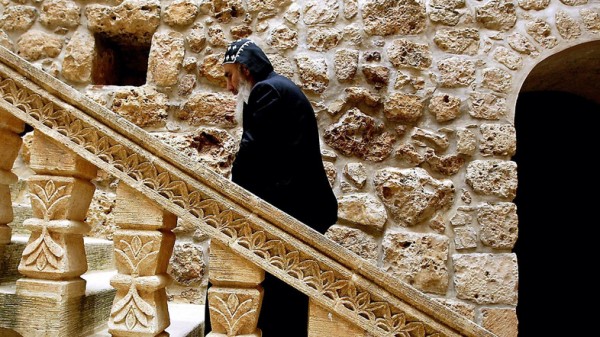
A Syriac priest climbs the stairs at the Syriac Orthodox Mor Gabriel monastery, in Turkish southeastern town of Midyat, 30 May 2004. (AFP)
ishtartv.com - english.alarabiya.net
By
Sonia Farid, Tuesday, 18 July 2017
The
ownership of around 50 churches, monasteries, and cemeteries that belonged to
the Syriac Orthodox Church for more than 1,500 years was transferred to the
Turkish Directorate of Religious Affairs (Dinayet), hence turned into public
facilities.
The
Syriac properties, which total hundreds of thousands of square meters, were
annexed by the directorate following the decision by the government committee
assigned the liquidation of assets whose ownership deeds expired. The decision
sent shock waves across members of the Syriac community who started fearing
that this could be the first step towards the extinction of their heritage.
Kuryakos
Ergun, chairman of the Mor Gabriel Monastery Foundation, said that an appeal
filed against the confiscation, which included the fifth-century monastery, was
rejected and highlighted the danger of losing this monastery, one of the
world’s oldest operational monasteries, and other Syriac houses of worship.
“Our
churches and monasteries are what root Syriacs in these lands; our existence
relies on them. They are our history and what sustains our culture,” he said.
“While the country should be protecting this heritage, we instead see our
culture is at risk.” Ergun added that the fifth-century Mor Meliki monastery is
also among the confiscated properties. “This monastery is set beside a spring
revered by pilgrims for its healing powers and was tended by two Syriac
families.”
Both
monasteries are located in the Tur Abdin region in southwest Turkey between the
Tigris and Euphrates rivers and which is known to be the historic center of
Syriac heritage and the heart of its monastic history. The name of the region
is Syriac for “mountain of the servants of God” and the region is home to more
than 80 monasteries.
Robert
Nicholson, the executive director of the Philos Project, which addresses the
problems of Christians in the Middle East, attributed the confiscation of
Syriac properties to new policies adopted by Erdogan’s government to control
minorities in the restive southwest. “In the case of the Syriac Christians,
Erdogan is using legal pretexts to seize and redistribute lands and churches
that have been owned by Christians for over a millennium,” he said.
Nicholson
noted that Christians were generally not persecuted by Turkish authorities and
did not face discriminatory practices under Erdogan, yet he argued that this
seems to be changing. “But Turkish politics are changing, and it's still
unclear how minority groups like the Syriacs will fare in the end.”
Turkish
journalist Uygar Gültekin explained that the whole process started when the
province of Mardin, the eastern part of which is located in Tur Abdin, was
officially turned into a metropolitan municipality, which allowed the
government to form a Transfer, Liquidation, and Redistribution Committee to
look into the status of properties located in the province. The committee
placed the properties at the disposal of the Treasury, which then transferred
them to Religious Affairs.
The
Treaty of Lausanne
Gültekin
noted that the decision to confiscate the Syriac properties is in violation of
the Treaty of Lausanne, which was also mentioned in the appeal filed by the Mor
Gabriel Monastery Foundation. “According to Article 42/3 of the Lausanne Treaty
the Turkish Government undertakes to grant full protection to the churches,
synagogues, cemeteries, and other religious establishments of the
above-mentioned minorities (non-Muslims).
All
facilities and authorization will be granted to the pious foundations, and to
the religious and charitable institutions of the said minorities at present
existing in Turkey, and the Turkish Government will not refuse, for the
formation of new religious and charitable institutions, any of the necessary
facilities which are granted to other private institutions of that nature,”
Gültekin wrote.
According
to the same treaty, Gültekin added, the Turkish government is not to issue any
laws or take any procedures that overrule this principle: “Evidently this
erroneous ownership status is in explicit violation of the Lausanne Treaty
which is the founding Treaty of the Republic of Turkey.”
Habib
Efram, president of the Syriac League in Lebanon, said that news of
confiscating Syriac properties in Turkey went unnoticed as was the case with
other violations to which the Syriacs in the Middle East were subjected.
“The
world has been watching since the massacres committed against our ancestors in
1915 and which were neither acknowledged nor punished,” he said in reference to
the mass killings of Syriacs by the Ottoman Empire during World War One and
which happened alongside the Armenian genocide. “In addition to what is
happening in Turkey, our legacy is being eliminated in Nineveh and Palmyra,” he
added.
According
to minorities’ expert Suleiman Yusuf, transferring the ownership of the Syriac
properties to the Directorate of Religious Affairs means that they will be
treated as Islamic endowments, which makes the future of all activities taking
place in them uncertain.
“Millions
of people perform pilgrimage every year to the monasteries that are now
confiscated. Dozens of nuns and monks also live in those monasteries in
addition to students who learn there,” he wrote. “Now all those will be under
the control of the Mufti which means they can be turned to mosques or Islamic
centers any time.”
|